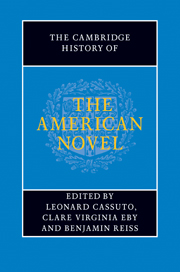Book contents
- Frontmatter
- General Introduction
- PART ONE INVENTING THE AMERICAN NOVEL
- Introduction: inventing the American novel
- 1 Transatlantic currents and the invention of the American novel
- 2 Susanna Rowson, Hannah Webster Foster, and the seduction novel in the early US
- 3 Charles Brockden Brown and the novels of the early republic
- 4 The novel in the antebellum book market
- 5 American land, American landscape, American novels
- 6 Cooper and the idea of the Indian
- 7 The nineteenth-century historical novel
- 8 Hawthorne and the aesthetics of American romance
- 9 Melville and the novel of the sea
- 10 Religion and the nineteenth-century American novel
- 11 Manhood and the early American novel
- 12 Sentimentalism
- 13 Supernatural novels
- 14 Imagining the South
- 15 Stowe, race, and the antebellum American novel
- 16 The early African American novel
- PART TWO REALISM, PROTEST, ACCOMMODATION
- PART THREE MODERNISM AND BEYOND
- PART FOUR CONTEMPORARY FORMATIONS
- A selected bibliography
- Index
7 - The nineteenth-century historical novel
from PART ONE - INVENTING THE AMERICAN NOVEL
Published online by Cambridge University Press: 28 July 2011
- Frontmatter
- General Introduction
- PART ONE INVENTING THE AMERICAN NOVEL
- Introduction: inventing the American novel
- 1 Transatlantic currents and the invention of the American novel
- 2 Susanna Rowson, Hannah Webster Foster, and the seduction novel in the early US
- 3 Charles Brockden Brown and the novels of the early republic
- 4 The novel in the antebellum book market
- 5 American land, American landscape, American novels
- 6 Cooper and the idea of the Indian
- 7 The nineteenth-century historical novel
- 8 Hawthorne and the aesthetics of American romance
- 9 Melville and the novel of the sea
- 10 Religion and the nineteenth-century American novel
- 11 Manhood and the early American novel
- 12 Sentimentalism
- 13 Supernatural novels
- 14 Imagining the South
- 15 Stowe, race, and the antebellum American novel
- 16 The early African American novel
- PART TWO REALISM, PROTEST, ACCOMMODATION
- PART THREE MODERNISM AND BEYOND
- PART FOUR CONTEMPORARY FORMATIONS
- A selected bibliography
- Index
Summary
In the history of the novel, the historical novel was a breakthrough genre. Until its arrival in the early nineteenth century, political and cultural elites had dismissed the novel as immature and childish, as “mere fiction.” Educators warned that readers would form dangerous illusions about reality by reading novels. The popular success of sentimental novels contributed to a perception of the novel as a primarily female genre. Literary activities by gentry-elites were limited to “respectable” literary forms such as the heroic verse epic, historical writing, the stage tragedy, the essay, or satirical prose forms in which the “Quixotism” of naïve novel readers could be exposed to ridicule. These authors were not yet professional writers but gentleman-amateurs who often did not sign their work by name in order to avoid the suspicion of writing for fame. The historical novel eventually changed all that: by shifting its subject to the serious matter of history, the novel gained cultural respectability and successfully countered charges of frivolous irrelevancy; by depicting a cross-section of classes, social groups, and regional characters, the novel redefined itself as a medium of national representation; by skillfully mixing historical references, sketches of local customs and manners, scenes of adventure, family sagas, as well as love stories in which national and personal fate coincided, the historical novel generated a new reading public that comprised both sexes more evenly and broke down the gender division in readership; finally, by focusing on grand topics such as revolutionary wars or key conflicts in a nation's history, the novel could be elevated to the rank of a modern epic that depicted the formation of a nation and captured the soul of its people.
- Type
- Chapter
- Information
- The Cambridge History of the American Novel , pp. 117 - 134Publisher: Cambridge University PressPrint publication year: 2011
- 1
- Cited by



